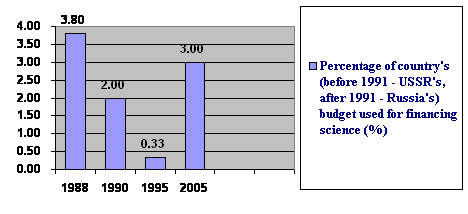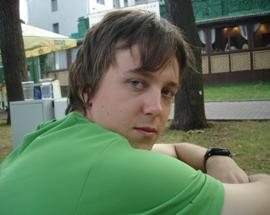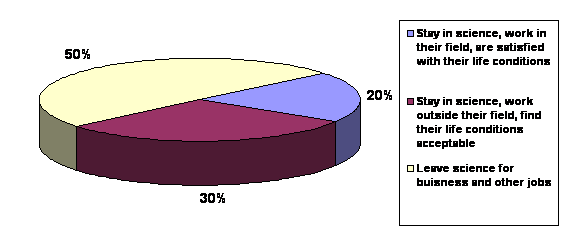

| Home | Our Leadership | Our Economies | Our Wars | Our Perspectives | Our Culture | Links | About |
By Helen Potapova

Information by the National Institute of Statistics and Information |
This mass brain-drain hasn’t been good for scientific development in Russia. Several fundamental areas of scientific inquiry have halted because of this trend. As the National Institute of Statistics and Information reports, today Russia accounts for less than 1% of the world’s science-intensive production. At the same time, the United States accounts for 10%, of which 25% are supplied by Russian scientists working there. Thanks to the brain-drain, Russia loses out on appproximately $60,000,000 per year.
The central question of the problem is: “Why do Russian scientists keep emigrating?” What are their motivations for leaving the country?


The first and main reason is, undoubtedly, money. An average Russian research assistant makes about $400 per month. Maxim Serih, A graduate of the Department of Management and Applied Mathematics, Moscow Institute of Physics and Technology (MPIT), supposes that “in our country to stay in fundamental science and to earn tolerable money at the same time is almost impossible. The government is not very interested in young talented scientists and the development of our science. Of course! They can profit from selling oil and gas, you know”.
The situation might change some day. And, according to reports from the National Institute of Statistics and Information, it seems to be already changing for the better. Perhaps
Russian science will rise in the future. Maybe…
But, today if a scientist decides to stay in Russia, he’ll have to make a choice between a job in his field and a well-paid job.
In fact, there is not only a shortage of payment in local science, but a shortage of funding as well. Gleb Kiselev, a graduate of the Department of Physics at Moscow State University, reasons, “The experimental basis in Russia is far from the world’s standards. We don’t have enough necessary instruments. We don’t have plants like CERN that could make research much more effective. No wonder that young scientists strive for going abroad where they’ll have everything necessary for the realization of their scientific projects.”
“In Russia everything can change in a minute. Today – one policy. Tomorrow – another. Today everything is fine. Tomorrow, a default in payments might happen, as it did in 1998, and all the prices will fly up unexpectedly. We seem to be living on the edge a volcano. Scientists are extremely sensitive. Such instability makes them nervous”, Serih said. Furthermore, Russian social factors, such as as the abolition of deferments of army service, plans to turn off hot water and weakness of the legal system can be quite strong reasons for scientists to emigrate.
 Some of them also regret the lack of interest in science in Russian society. For instance, Dmitry Solomentsev, a student of Moscow Engineering Physics Institute (MEPHI), considers that “Russian science is not acclaimed by either the government or the population. Being a scientist in this country is not of prestige anymore and science itself is absolutely unfashionable.”
Some of them also regret the lack of interest in science in Russian society. For instance, Dmitry Solomentsev, a student of Moscow Engineering Physics Institute (MEPHI), considers that “Russian science is not acclaimed by either the government or the population. Being a scientist in this country is not of prestige anymore and science itself is absolutely unfashionable.”
Dmitry Solomentsev
The scientists’ reasons for going abroad look quite convincing. But can emigration be a universal solution? Do they avoid all listed difficulties just by moving to the other country? Or, maybe they face other difficulties there? What are the real conditions for Russian scientists working abroad, and especially in the USA? These are burning questions which often arise during talks about the brain-drain from Russia.
On the whole, Russian scientists are in high demand in the United States.
A graduate of MPIT, Boris Hattatov, migrated from Russia to the U.S. in 1991. Now, he lives in Boulder, Colo. and works full time for a small startup biotechnology company which is developing a novel medical diagnostic instrument that can detect early stages of cancer and help in the creation of new pharmaceutical drugs. Hattatov’s job is doing mathematical modeling and building data analysis. According to him, “There are two other Russians in the company. One of them is a member of the Russian academy of sciences, even though he is an American citizen.”
In Hattatov’s view, Russian scientists are appreciated abroad for their impressive educations and for their ability to find unconventional solutions. This is probably why the USA actively recruits them, offering high paying jobs and vast research funding.
The question is: who exactly is receiving those offers? Serih considers that they are “mostly world-known Russian doctors of science.” Hattatov confirms that “a post-doctoral scientist would get in the U.S. about $40K per year. An experienced scientist with good recognition will easily make $200K per year in the industry and $100-150K in academia”.
But, what about promising beginners without “a big name” in science? Are they being courted by U.S. firms and universities? It depends. In 1991, Hattatov was offered $900 per month for being a graduate student in the U.S., while in Russia at that time he could get only $90 per month being a scientist. At the same time, however, there also are some Russian scientists working in the United States producing research in the fundamental scientific field of cell biology who can’t persuade American colleagues to invest money in their work. The problem is that on the basis of their research, no new drug and no new commercial product will be invented; they won’t bring immediate profit. Though these studies may considerably cut down expenses for biological investigations in the long run, the USA doesn’t invest in them because there is no immediate profit motivation.

Russian scientists working abroad
Funding of science in the USA is undoubtedly broader than in Russia. According to the National Institute of Statistics and Information, the total amount of science financing in Russia is close to the budget of an average American university. In 2000 alone, the U.S. spent €287,000,000,000 for scientific and engineering research. Moreover, American companies aren’t lacking any new technologies, instruments and materials. So, that scientists working there usually can get all they need to produce quality work.
Nevertheless, Russian scientists in the U.S. still face problems concerning funding.
Boris used to work at the National Center for Atmospheric Research, but he quit and started his own Research and Development company. Funding for R&D got very tight after the Iraq war and he had to close the company. Now, he works for a startup organization and acclaims that “financing is never enough in startups.”
Russian scientists are likely to face problems both at home and abroad. Although these difficulties have much in common, in each country they have their own national specificity as well. For instance, in Russia scientists have to deal mainly with a shortage of funding and a general lack of public interest, while in the U.S. those scientists haveto overcome the language barrier and to prove their ability to produce profitable research.
During the past 20 years, lots of Russian scientists have preferred to immigrate to the USA. But even those who have obtained jobs in their field and impressive financial gain sometimes miss their native land. Many of them would be happy to communicate with Russian scientists, to share the experience with ex-compatriots and to help them with their research projects. Unfortunately, such forms of cooperation and assistance, as well as study courses abroad, are still quite rare in our country. In reality they are our almost only available opportunity to slow down the brain-drain.